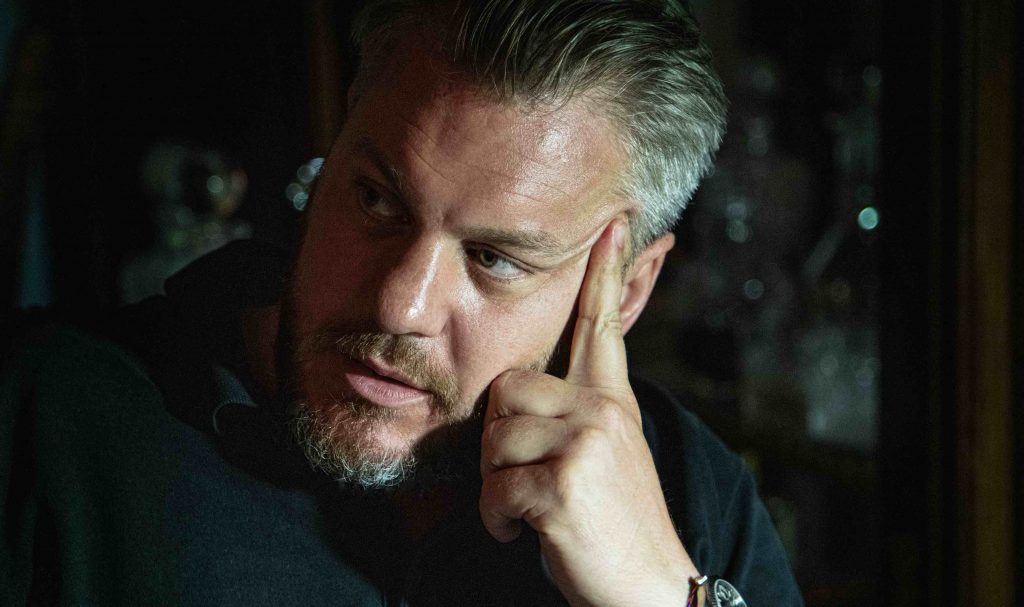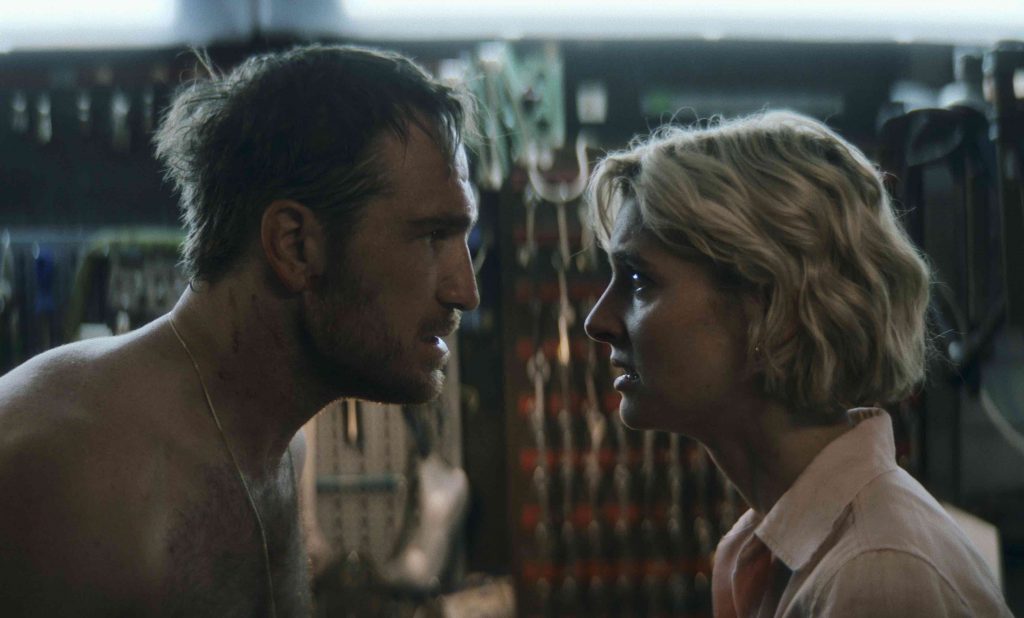„Crooks“, the most elaborate series to date from Marvin Kren, who wrote German-language series history with „4 Blocks“ and „Freud“, starts tomorrow on Netflix. A conversation with the Austrian about genre, ambition and the gangster’s code of honor.

You originally started out as a filmmaker who wanted to make genre cinema – „Rammbock“, „Blutgletscher“. Now you are one of the leading showrunners for German-language event series. How do you yourself assess this path, this development?
Marvin Kren: I am extremely satisfied. When we started 15 years ago with „Rammbock“, it was the first German-language zombie film. Although there is of course a long tradition of scary films in German and Austrian cinema, we realized that we were entering new territory with our approach. But we also noticed that there was a hunger, a desire for German genre material. There was a saturation of what was already there and a hunger for something new.
Which also describes the development in the German-language series sector.
Marvin Kren: For me, it was a very natural development. When I presented „Blutgletscher“ at the Toronto International Film Festival in 2013, I received an invitation to a Netflix party. I didn’t really know what that was, Netflix, but I thought the „N“ was very cool. Today, we all have this „N“ permanently on view on our remote controls. When I look at what Netflix has made possible, I am very grateful: It may be a global company, but they allow for us to make genre pieces that are shaped by our perception in our culture. I am privileged and happy to be part of this. That I was allowed to tell „Freud“. And now to be able to make „Crooks“ for such a large community of viewers.
Speaking of the rapid development, one should not forget to mention „4 Blocks“, the first major German horizontally narrated series in 2017 alongside „Dark“ and „You Are Wanted“. Were you aware that you were doing pioneering work?
Marvin Kren: We certainly knew that we wanted to do something that hadn’t been done before. You could feel that there was a desire on the part of the viewers to see something that they hadn’t seen before in this form, a new experience. So we were motivated. However, we didn’t expect the series to take off like that. It caught us off guard. That’s not just a blessing, but can also be a curse, at least a little bit. Something was set in motion that we all didn’t know what it would mean, what dimensions it would take on.
We’ll come to „Crooks“ in a moment, but let me quickly ask you whether this development has also changed you as a filmmaker, your view of material in general and how you work on it?
Marvin Kren: I was naïve and curious. Of course it was clear to me that you have to work differently on a series than on a film. I didn’t have a precise plan, I just went for it. Learning by doing. Making a series, as I can now emphasize with the experience of three series, requires different tools, a different breath, a different stamina than a film, whether for cinema or television. It is a different discipline.
For which you now have some experience, as one can clearly see in „Crooks“.
Marvin Kren: After „Freud“, I felt a bit trapped in the corona bubble. The series started right in the middle of the first lockdown phase, and I suddenly found myself thrown back on myself and a piece of paper and the question of how I wanted to continue. I immediately realized that, as a filmmaker, there was a great longing to dive back into the world of gangsters and the underworld, to tell more about it, but to tell it differently than I had done before. I used the time to further my cinematic education and training and went back to the old gangster films, going all the way back to the Hollywood of the late twenties and the French version of the genre in the sixties.
Was there a particular discovery?
Marvin Kren: I got stuck on „Classe tous risques“ from 1960, an early Claude Sautet movie starring Lino Ventura and Jean-Paul Belmondo, a great movie about friendship in the bitterly evil world of criminals. This theme of friendship in a very serious context appealed to me. That really was the initial spark. Then there was the idea of a cab driver, a little nobody, who I really wanted to cast with an esteemed actor from my film family, Christoph Krutzler. I also knew that I wanted to work with Frederick Lau again. So it slowly came together: an Austrian and a German – how do I bring them together? And then I wanted to break out. That was important to me. I didn’t want to limit myself to the worlds I knew, not Austria, not Germany. I wanted to get out and take a trip to my role models in France.

And yet you are bringing together the worlds of your two previous works – the Berlin of „4 Blocks“ and the Vienna of „Freud“…
Marvin Kren: But that’s just the beginning! There are more underworlds to come! France, a bit of Italy and the former Yugoslavia. I feel committed to the world of „4 Blocks“, its very special habitus. I like the operatic quality. There’s something very cinematic about this exaggerated code of honor among families. If you have the right actors to convey that, then you can add a very rich note to a gangster series. The Viennese in the way they are shown are an invention, though. They no longer exist, characters like Der Rote, Der Rio or Der Zwanziger. Vienna is such a delicate plant. Sure, there is crime, but you won’t find anything so archaic, so original. We have brought them from the past into the present, with the help of long and extensive research. I like them, the quirky characters who have fallen out of time and who, despite all their harshness, also have a sense of humor. A nice and important counterpoint to the violence of the Berlin gangs.
You are a filmmaker who seeks out new challenges with every project. What was new about „Crooks“, what was its particular appeal?
Marvin Kren: A common theme for me is to delve into forbidden worlds and try to tell them authentically, to work through them, to bring them to the viewer. But of course I don’t make documentaries. They are fictions, but they have their origins in reality and always play with reality. But it’s the wide range of subjects that made „Crooks“ special for me, this huge panopticon of different worlds: Families, syndicates, different countries. It was a huge task to show and portion the sheer mass of information and characters in such a way that the audience could follow along and not feel overwhelmed.
Can I assume that „Crooks“ was your most elaborate work to date?
Marvin Kren: Definitely. Elaborate also in the sense that it was important to me to make the series look very high quality, always like a movie, with the crucial difference that you have more time to shoot a movie. With a series, you have to do a lot more every day. In terms of work, it was very challenging in all phases, even in the script process. It wasn’t easy to introduce the many characters and locations in such a way that you always have an overview and at the same time don’t let the tension slip. The suspense has to be right, every episode has to end with a climax.
Who are the most important collaborators for you in realizing such material?
Marvin Kren: First and foremost, of course, my two co-creator colleagues: Benjamin Hessler, with whom I studied and did all my important work, and Georg Lippert, who is new to the group, also an Austrian author, without whom I could never have made “Crooks”. Equally important is the great technical team, especially the camera, but also my producer Quirin Berg as well as Jan Bennemann from Netflix. And before I forget: Without the actors, especially my leads, we wouldn’t have had a series at all.
You worked on „Crooks“ for several years, and you probably still lack the necessary distance at this point in time to be able to categorize this work for yourself. But the question remains: how do you feel about „Crooks“ now that the artistic journey is complete and the series is about to be launched?
Marvin Kren: I think „Crooks“ is my best work to date. Because I was able to act more freely here than before and was less obsessive. It was important to me to put the characters in the foreground and to put my work as a creator and director at their service. The story should always have priority, the rest should be subordinate to it. That was a good exercise for me, because I not only understood, but also learned as a filmmaker to step back and surrender myself to the work. It was three and a half years of intensive work, a constant journey through the depths of the human soul. Of course it touched me, it took a toll on me, it was a burden. But that’s the artist’s job. You can’t make it easy for yourself!
Interview by Thomas Schultze
